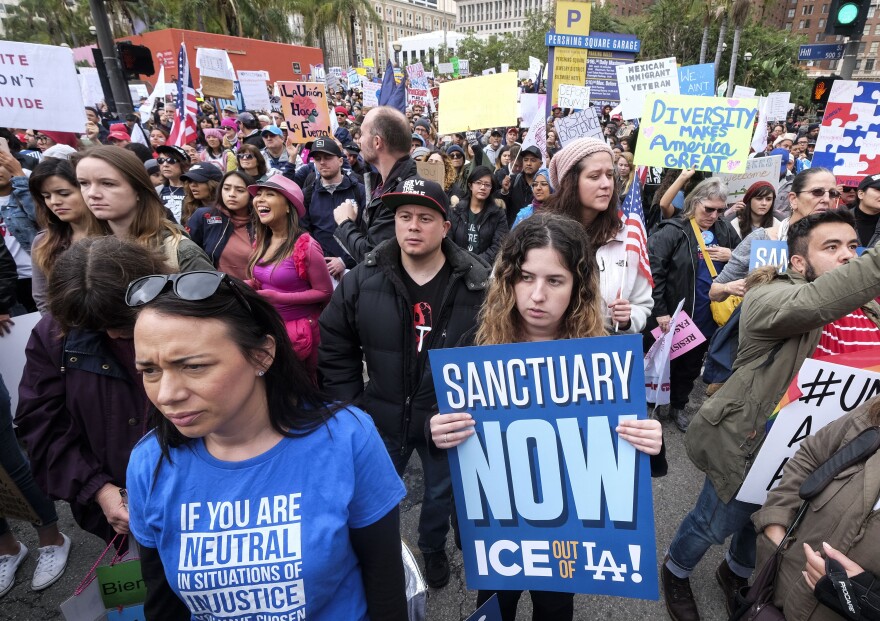This story is free to read because readers choose to support LAist. If you find value in independent local reporting, make a donation to power our newsroom today.
This archival content was originally written for and published on KPCC.org. Keep in mind that links and images may no longer work — and references may be outdated.
Legal scholars to Trump: White House can't legally defund 'sanctuary cities'

Nearly 300 law professors signed a letter sent to the White House on Monday that asserts President Trump's threat to pull federal funding from so-called "sanctuary cities" is unconstitutional.
The funding threat is part of an executive order signed by Trump the week after his inauguration in January. While there is no clear definition as to just what a sanctuary city is, the term loosely applies to cities and counties with policies that protect unauthorized immigrants.
Some cities, such as Santa Ana, have officially declared themselves sanctuaries. Others, like Los Angeles, have immigrant-friendly policing policies; for example, Los Angeles police have Special Order No. 40, which bars officers from stopping people to ask about their immigration status.
The legal scholars’ letter says that policies like these are legal — and that the Trump administration’s threat is not.
“For any jurisdictions that are grappling with this federal threat, what the executive order means ... I think this letter should help to reassure those jurisdictions that passing sanctuary policies is fully within their rights," said Annie Lai, a law professor at the University of California, Irvine.
Lai helped draft the letter and is one of the 292 legal scholars who signed it. The effort was coordinated by the Immigrant Legal Resource Center, a national immigrant advocacy group that reached out to scholars in the fields of constitutional, immigration, administrative and international law.
Lai said forcing local and state jurisdictions to comply with federal policies by withholding grants violates the 10th Amendment, which protects states’ rights.
The letter also points out that in 2012, in a lawsuit related to the Affordable Care Act, the U.S. Supreme Court ruled that the federal government could not force states to expand Medicaid by threatening to withhold federal funds. That decision has been held by some legal experts as a precedent for how the Trump administration might have trouble legally defending a decision to withhold cities' federal grants.
Not all legal experts agree with the letter. Constitutional law professor John Eastman at Chapman University is one who did not sign it. He says the federal government has the legal right to place conditions on federal grants — for example, grants that help pay for local policing.
"A lot of times we have monies that are provided that the states have a right to, but they come with conditions," Eastman said. "And the courts have made clear that we can impose those conditions if they are related to the purposes of the federal money, and the conditions are unambiguous."
In Los Angeles, about 5.6 percent of the city's $8.8 billion 2016-1017 budget comes from federal funds, according to the office of the City Administrative Officer. That amounts to about $506 million.
This includes community development block grants that help pay for affordable housing. The funds help with other public services, including port security, transit programs, library programs and public safety, according to city officials.
Los Angeles officials have pointed out that the federal money that California cities receive is less than what they pay in federal taxes. California is considered a "donor state" in that it pays more in taxes than it receives in federal money.
The administration has yet to try to defund local jurisdictions over their immigration policies. But some local governments have already sued, including the city and county of San Francisco.







